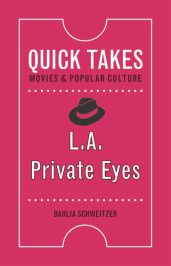Los Angeles and New York always have been the top locations for the fictional hard-boiled detective, both private or in law enforcement.
L.A. can boast with being home of such heavyweights as Philip Marlowe, Mickey Haller, Lew Archer, Ezy Rawlins and several others.
 Crime, murder, abuse, corruption and horror will not show in L.A. as unusual and terrible anomalies; instead, in fiction and film – and not just there – they are the norm and happen continuously.
Crime, murder, abuse, corruption and horror will not show in L.A. as unusual and terrible anomalies; instead, in fiction and film – and not just there – they are the norm and happen continuously.
This makes PI (Private Investigator) stories in L.A. (in film noir and hardboiled crime fiction) so complicated and full of turns, since uncovering one crime, blackmail or murder will most likely unearth and hint at many other atrocities. In its short history, the city has been subject to police corruption and crime more than any other major American city.
Author Dahlia Schweitzer, professor at Art Center College of Design in Pasadena, obviously connects a strong interest in L.A. with a number of subjects on the city and its fictional PIs by rendering good abstracts and offering brief overviews in each chapter.
She reflects on people (authors, real people and movie/novel characters) and the city as something close to a living organism, its streets that detectives and cops in their prowl cars travel in a certain way, the sounds and the overall artificial feel of the place in fiction and films are captured rather well in her analysis.
After a brief introduction to the genre of American PI fiction, subsequent chapters are named “The Detective Story,” “The Detective,” and naturally the main protagonist, the city of Los Angeles. She also draws attention to some mostly neglected types of PIs, namely “The Lady Dick” and “The Girl Sleuth” (who is usually an amateur, but there are exceptions) and “The Black Detective.”
Other subjects are TV and movie detectives based in L.A. such as “Rockford,” Mannix,” “Peter Gunn,” “Matt Houston,” (and their cars as either symbols of masculinity or surrogate offices as in “Lincoln Lawyer”), their respective representatives from hard-boiled novels, and Neo-Noir movies all set in L.A. and vicinity. She also briefly introduces different types of detectives (private or police force) with their sidekicks and sometimes unusual networks. As “…the L.A. private detective cannot exist anywhere else.”
Altogether, this is a concise and informative “quick take” (from the Rutgers University Press Quick Takes series) on the subject that will serve as an excellent short guide to the theme and to the city as well. However, film noir students or detective fiction fans will not find new theories, conclusions or research results here. It is, after all, a “quick take” that briefly sums up the main/standard information on fictional PIs from this city and puts them into the context of the unusual surroundings there.
Review by Dr. A. Ebert © 2019
Dahlia Schweitzer. L.A. Private Eyes (Quick Takes: Movies and Popular Culture). Rutgers University Press, 2019, 188 p.
